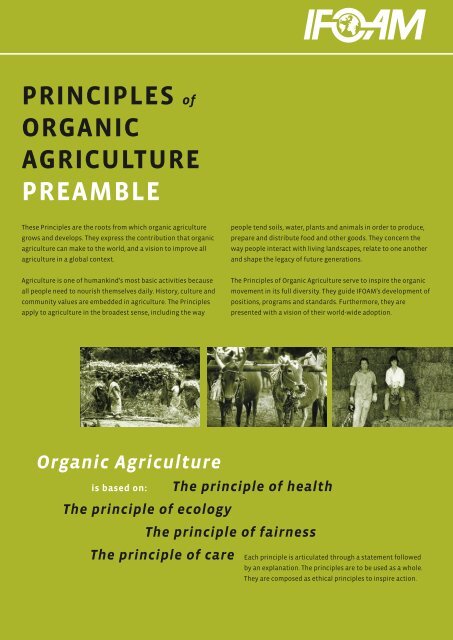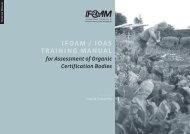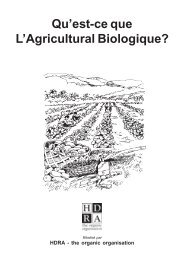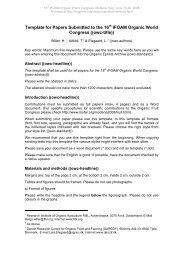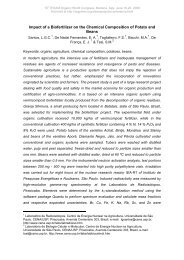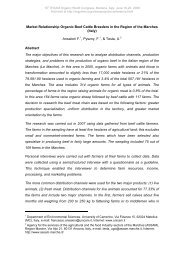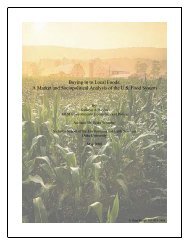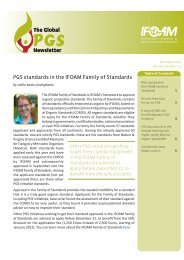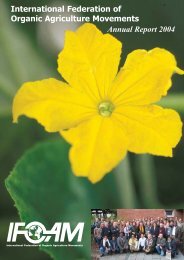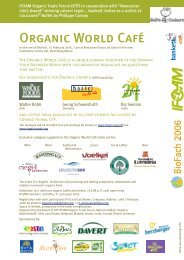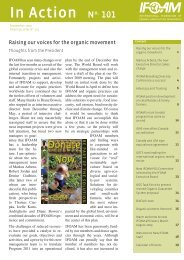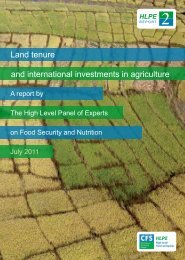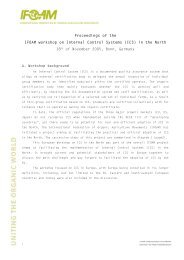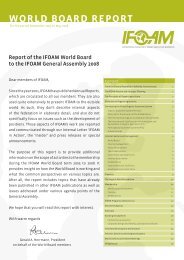PRINCIPLES of ORGANIC AGRICULTURE PREAMBLE - ifoam
PRINCIPLES of ORGANIC AGRICULTURE PREAMBLE - ifoam
PRINCIPLES of ORGANIC AGRICULTURE PREAMBLE - ifoam
You also want an ePaper? Increase the reach of your titles
YUMPU automatically turns print PDFs into web optimized ePapers that Google loves.
<strong>PRINCIPLES</strong> <strong>of</strong><br />
<strong>ORGANIC</strong><br />
<strong>AGRICULTURE</strong><br />
<strong>PREAMBLE</strong><br />
These Principles are the roots from which organic agriculture<br />
grows and develops. They express the contribution that organic<br />
agriculture can make to the world, and a vision to improve all<br />
agriculture in a global context.<br />
Agriculture is one <strong>of</strong> humankind’s most basic activities because<br />
all people need to nourish themselves daily. History, culture and<br />
community values are embedded in agriculture. The Principles<br />
apply to agriculture in the broadest sense, including the way<br />
Organic Agriculture<br />
is based on:<br />
The principle <strong>of</strong> ecology<br />
people tend soils, water, plants and animals in order to produce,<br />
prepare and distribute food and other goods. They concern the<br />
way people interact with living landscapes, relate to one another<br />
and shape the legacy <strong>of</strong> future generations.<br />
The Principles <strong>of</strong> Organic Agriculture serve to inspire the organic<br />
movement in its full diversity. They guide IFOAM’s development <strong>of</strong><br />
positions, programs and standards. Furthermore, they are<br />
presented with a vision <strong>of</strong> their world-wide adoption.<br />
The principle <strong>of</strong> health<br />
The principle <strong>of</strong> fairness<br />
The principle <strong>of</strong> care<br />
Each principle is articulated through a statement followed<br />
by an explanation. The principles are to be used as a whole.<br />
They are composed as ethical principles to inspire action.
<strong>PRINCIPLES</strong> <strong>of</strong> <strong>ORGANIC</strong> <strong>AGRICULTURE</strong><br />
Principle <strong>of</strong> Principle <strong>of</strong><br />
HEALTH ECOLOGY<br />
Organic Agriculture should<br />
sustain and enhance the health <strong>of</strong> soil,<br />
plant, animal, human and planet as<br />
one and indivisible.<br />
This principle points out that the health <strong>of</strong> individuals and<br />
communities cannot be separated from the health <strong>of</strong><br />
ecosystems - healthy soils produce healthy crops<br />
that foster the health <strong>of</strong> animals and people.<br />
Health is the wholeness and integrity <strong>of</strong> living systems. It is<br />
not simply the absence <strong>of</strong> illness, but the maintenance <strong>of</strong><br />
physical, mental, social and ecological well-being. Immunity,<br />
resilience and regeneration are key characteristics <strong>of</strong> health.<br />
The role <strong>of</strong> organic agriculture, whether in farming, processing,<br />
distribution, or consumption, is to sustain and enhance the<br />
health <strong>of</strong> ecosystems and organisms from the smallest in the<br />
soil to human beings. In particular, organic agriculture is<br />
intended to produce high quality, nutritious food that<br />
contributes to preventive health care and well-being. In view<br />
<strong>of</strong> this it should avoid the use <strong>of</strong> fertilizers, pesticides, animal<br />
drugs and food additives that may have adverse health effects.<br />
Organic Agriculture should be based<br />
on living ecological systems and cycles,<br />
work with them, emulate them and<br />
help sustain them.<br />
This principle roots organic agriculture within living<br />
ecological systems. It states that production is to be based<br />
on ecological processes, and recycling. Nourishment and<br />
well-being are achieved through the ecology <strong>of</strong> the specific<br />
production environment. For example, in the case <strong>of</strong> crops<br />
this is the living soil; for animals it is the farm ecosystem;<br />
for fish and marine organisms, the aquatic environment.<br />
Organic farming, pastoral and wild harvest systems should<br />
fit the cycles and ecological balances in nature. These cycles<br />
are universal but their operation is site-specific. Organic<br />
management must be adapted to local conditions, ecology,<br />
culture and scale. Inputs should be reduced by reuse, recycling<br />
and efficient management <strong>of</strong> materials and energy in order to<br />
maintain and improve environmental quality and conserve<br />
resources.<br />
Organic agriculture should attain ecological balance through<br />
the design <strong>of</strong> farming systems, establishment <strong>of</strong> habitats and<br />
maintenance <strong>of</strong> genetic and agricultural diversity. Those who<br />
produce, process, trade, or consume organic products should<br />
protect and benefit the common environment including<br />
landscapes, climate, habitats, biodiversity, air and water.
Principle <strong>of</strong> Principle <strong>of</strong><br />
FAIRNESS CARE<br />
Organic Agriculture should build on<br />
relationships that ensure fairness with<br />
regard to the common environment<br />
and life opportunities.<br />
Fairness is characterized by equity, respect, justice and<br />
stewardship <strong>of</strong> the shared world, both among people<br />
and in their relations to other living beings.<br />
This principle emphasizes that those involved in organic<br />
agriculture should conduct human relationships in a manner<br />
that ensures fairness at all levels and to all parties – farmers,<br />
workers, processors, distributors, traders and consumers.<br />
Organic agriculture should provide everyone involved with<br />
a good quality <strong>of</strong> life, and contribute to food sovereignty<br />
and reduction <strong>of</strong> poverty. It aims to produce a sufficient<br />
supply <strong>of</strong> good quality food and other products.<br />
This principle insists that animals should be provided with the<br />
conditions and opportunities <strong>of</strong> life that accord with their<br />
physiology, natural behavior and well-being.<br />
Natural and environmental resources that are used for<br />
production and consumption should be managed in a way<br />
that is socially and ecologically just and should be held in<br />
trust for future generations. Fairness requires systems <strong>of</strong><br />
production, distribution and trade that are open and equitable<br />
and account for real environmental and social costs.<br />
Organic Agriculture should be managed<br />
in a precautionary and responsible<br />
manner to protect the health and<br />
well-being <strong>of</strong> current and future<br />
generations and the environment.<br />
Organic agriculture is a living and dynamic system that<br />
responds to internal and external demands and conditions.<br />
Practitioners <strong>of</strong> organic agriculture can enhance efficiency and<br />
increase productivity, but this should not be at the risk <strong>of</strong><br />
jeopardizing health and well-being. Consequently, new<br />
technologies need to be assessed and existing methods<br />
reviewed. Given the incomplete understanding <strong>of</strong><br />
ecosystems and agriculture, care must be taken.<br />
This principle states that precaution and responsibility are the<br />
key concerns in management, development and technology<br />
choices in organic agriculture. Science is necessary to ensure<br />
that organic agriculture is healthy, safe and ecologically sound.<br />
However, scientific knowledge alone is not sufficient. Practical<br />
experience, accumulated wisdom and traditional and<br />
indigenous knowledge <strong>of</strong>fer valid solutions, tested by time.<br />
Organic agriculture should prevent significant risks by<br />
adopting appropriate technologies and rejecting unpredictable<br />
ones, such as genetic engineering. Decisions should reflect<br />
the values and needs <strong>of</strong> all who might be affected, through<br />
transparent and participatory processes.
<strong>ifoam</strong>‘s mission is leading,<br />
uniting and assisting the<br />
organic movement in its full<br />
diversity.<br />
our goal is the worldwide<br />
adoption <strong>of</strong> ecologically,<br />
socially and economically<br />
sound systems that are based<br />
on the principles <strong>of</strong> organic<br />
agriculture.<br />
IFOAM Head Office<br />
Charles-de-Gaulle-Str. 5<br />
53113 Bonn, Germany<br />
Phone: +49 - 228 - 92650 - 10<br />
Fax: +49 - 228 - 92650 - 99<br />
Email: HeadOffice@<strong>ifoam</strong>.org<br />
www.<strong>ifoam</strong>.org


